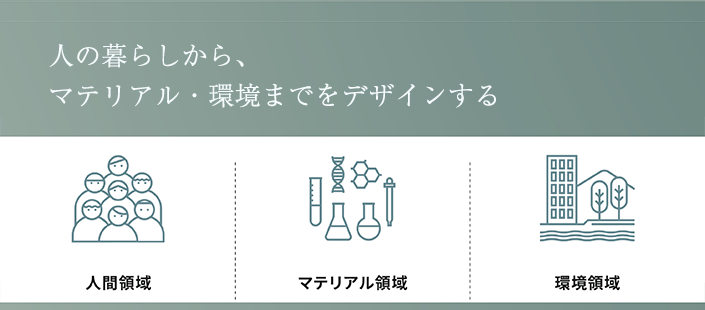- Top
- Human-Centered Engineering
ページの本文です。

Human-Centered Engineering
Creating New Technologies and Societies for People and the Environment to Achieve a Sustainable and Inclusive Society
Society is currently undergoing significant changes, and with economic development and the advance of globalization and digitalization, we can expect to see the arrival of a sustainable well-being society. We face environmental issues due to climate change and social problems, such as an ageing population, impacting our daily lives. To tackle these issues and create a society that is inclusive of diverse people, it is necessary to have the perspective and technology to discover new value by having diverse people participate in developing product development and innovations. Human environmental engineering uses new technologies and data science based on engineering and natural science to tackle these issues. We promote innovation through design thinking while interacting with diverse people and collaborating with social sciences to create and disseminate new things.
Human-Centered Engineering consists of three specialized engineering domains: "Human Domain", "Material Domain", and "Environmental Domain." In the Department of Human-Centered Engineering, we start by exploring the concept of a sustainable and inclusive society using social sciences, and then collaborate across the related engineering domains mentioned above. This approach develops the ability to 'co-create' solutions to societal challenges through data-driven data science, design thinking, and engineering design and production.
Human Domain
This domain focuses on the direct support of human activities through engineering technologies and includes areas such as ergonomics, health science, biomedical engineering, biology, and natural anthropology related to the human body.
Material Domain
This domain enhances engineering design from a material perspective, focusing on functional textile materials related to daily life and biomaterials used in pharmaceuticals that interact with the human body.
Environmental Domain
This domain deals with interior design, housing, architectural planning and design, building history and preservation, urban climate, urban design, energy and green infrastructure, water environments, and resource cycles.
Education and Research of the Department of Human-Centered Engineering
We will apply the engineering and natural sciences, which have contributed to the formation of advanced social infrastructure, to improving safety, security and comfort, focusing on the various people and societies. Students will learn basic engineering and natural sciences knowledge and study multiple humanities and social sciences fields offered by the Faculty of Transdisciplinary Engineering or the other faculties at Ochanomizu University to discover issues based on their interests. In addition, they will learn design thinking, design technology, data science, etc., to acquire the skills to engage in dialogue with society, co-create with various fields, and give back to society the results of their work. In addition, students will engage in multiple practical exercises, such as workshops and internships, to understand communication and social implementation. Through this, they will hone their ability to promote innovation through 'inclusion of diversity' and aim to promote human-centred engineering technology.








